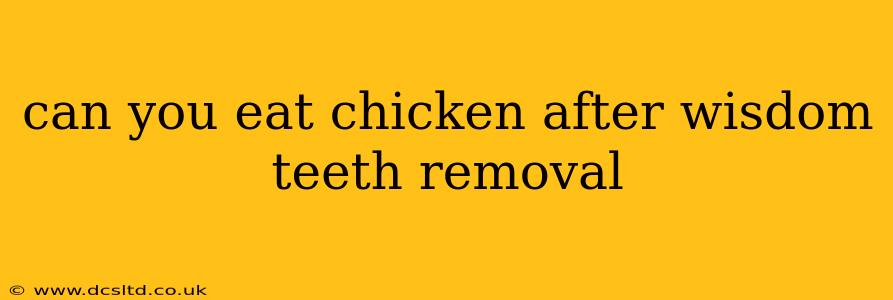Can You Eat Chicken After Wisdom Teeth Removal? A Guide to Post-Surgery Diet
Having your wisdom teeth removed is a significant oral surgery, and proper post-operative care is crucial for a smooth recovery. One of the most common questions patients have revolves around diet: what can and can't you eat? Chicken is a popular protein source, but its texture and consistency raise questions about its suitability after wisdom teeth extraction. Let's delve into the details.
The Short Answer: Generally, yes, you can eat chicken after wisdom teeth removal, but it depends on the consistency and how it's prepared.
Understanding the Post-Surgical Diet
The key to a successful recovery after wisdom teeth extraction is a soft, bland diet for the first few days. This allows the extraction sites to heal without irritation or infection. Your diet will gradually transition to normal foods as your healing progresses. The initial focus is on avoiding anything that could dislodge blood clots, cause pain, or get stuck in the extraction sites.
Can you eat chicken after wisdom teeth removal? The specifics:
What types of chicken are suitable after wisdom teeth removal?
Suitable Chicken Options:
-
Pureed or very finely shredded chicken: This is the safest option in the first few days. You can blend cooked chicken into a smooth puree, similar to baby food. Alternatively, very finely shred the chicken and ensure there are no large pieces.
-
Chicken broth: This is excellent for hydration and provides some nutrients. Make sure it’s low in sodium.
-
Soft chicken salad (carefully prepared): Ensure the chicken is finely chopped or shredded and mixed with very soft ingredients like mayonnaise (if tolerated) or a plain yogurt base. Avoid any crunchy elements like celery or nuts.
Chicken Options to Avoid:
- Fried chicken: The crispy texture is far too rough for healing gums.
- Chicken with bones: There's a significant risk of accidentally swallowing or injuring your mouth with bone fragments.
- Tough or chewy chicken: Anything that requires excessive chewing should be avoided.
- Chicken with hard or crunchy toppings: Avoid any added ingredients that could cause irritation or damage to the healing sockets.
How long should you wait before eating chicken after wisdom teeth removal?
The time frame for reintroducing chicken depends on your individual healing process and your surgeon's instructions. In the initial 24-48 hours, focus on liquids and pureed foods. After that, you can gradually introduce softer, well-cooked chicken options.
What are some alternative foods to eat after wisdom teeth removal?
There are plenty of other soft food options suitable after wisdom teeth extraction:
- Yogurt (plain or low sugar)
- Applesauce
- Mashed potatoes
- Scrambled eggs
- Oatmeal
- Smoothies
- Pudding
What are the risks of eating the wrong foods after wisdom teeth removal?
Eating inappropriate foods after wisdom teeth removal can lead to several complications:
- Dry socket: This painful condition occurs when a blood clot is dislodged from the extraction site, exposing the bone. Certain foods can dislodge clots.
- Infection: Food particles can get trapped in the sockets, increasing the risk of infection.
- Prolonged healing: Irritation from rough foods can delay the healing process.
How can you prepare chicken safely after wisdom teeth removal?
When preparing chicken, ensure it's cooked thoroughly and completely shredded or pureed before consumption. Avoid any hard or crunchy elements. Let the chicken cool slightly before eating to avoid burning your sensitive gums.
Remember, every patient's recovery is different. Always follow your oral surgeon's specific instructions regarding diet and post-operative care. If you have any concerns or experience any complications, contact your surgeon immediately. This information is for general guidance only and does not replace professional medical advice.
